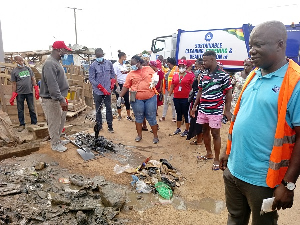In a recent effort to promote environmental awareness, the leadership of the Agomanya market in the Eastern Region, with support from the Municipal Chief Executive (MCE) for Lower Manya Krobo and the Assemblymember for Agormanya-South Electoral Area, led a comprehensive cleanup exercise across the facility to maintain sanity within the environment.
The exercise, which began in the early hours of Thursday, June 27, 2024, aimed at desilting choked gutters in the market. The participants were actively involved in clearing the gutters and sweeping the streets, significantly enhancing the cleanliness of the location.
The initiative by the market women and residents underscored the importance of a clean environment within the major trading facility.
Patience Ababio, secretary to the Agomanya market queens, in an interview, justified the importance of the cleanup exercise.
She argued that the sale of food items at the facility called for a clean and healthy environment to ensure the safety of traders and consumers.
She commended the participants for the massive turnout and urged others to join future exercises.
Miss Ababio also reiterated earlier calls for places of convenience in the market to serve the thousands of patrons.
Veronica Annor, the queen mother for the mat sellers, also expressed her satisfaction with the success of the exercise, adding that it enhanced its status.
Assemblymember for the Agormanya-South electoral area, Rafat Mohammed, underscored the importance of regular cleanup exercises around the facility.
He furthered that threats of diseases and other effects would be eliminated with periodic exercises in the future.
According to him, the exercise would be conducted on a regular basis to maintain the sanctity of the environment, but he urged his electorate and the market women to continue to observe good sanitation practices at all times, in and out of the market, to ensure good health.
The Municipal Environmental Health Officer (MEHO) for Lower Manya Krobo, Mr. Gordon Amevor, described the sanitation situation at the market as "very defective" due to its large size.
Though he bemoaned the small size of the drainage system in the facility, he blamed the poor sanitation situation on the indiscriminate dumping of refuse in the market.
The MEHO also bemoaned the inadequate number of refuse containers in the market as a contributory factor but nevertheless urged market women, the general public, and commuters to maintain responsible waste disposal practices by refraining from indiscriminate dumping of refuse into the drains.
Following the successful completion of the exercise, the MCE, Simon Kweku Tetteh, expressed his heartfelt gratitude to all participants for their dedication and hard work.
He emphasized the critical role of cleanliness in promoting good health, aligning with the adage, "Cleanliness is next to godliness."
Stressing the continuity of the exercise to ensure that the market is kept clean at all times, Mr. Tetteh emphasized the importance of collective responsibility in maintaining a hygienic environment conducive to good health.
On security, the MCE remarked that some streetlights had been fixed in the market. He gave the firm assurance that additional ones would be installed in the coming days to enhance security and visibility at night.
The cleanup exercise was a fallout from the Youth and Women Empowerment (YOWE)'s Action for Voice and Inclusive Development (AVID) project implemented in the Upper Manya Krobo District and Lower Manya Krobo Municipality of the Eastern Region.
Beneficiaries of the project, which included market women speaking after its 15-month rollout, identified regular cleanup exercises at the market as a key takeaway from the engagements with the project.
The women identified good sanitation and hygiene in the market as an incentive to attract more buyers and consumers and appreciated that displaying food items on the bare floor has health implications for consumers.
They revealed these during an end-of-project extensive evaluation forum dubbed "End of Project Learning Event" held at Odumase-Krobo and Asesewa in the Lower Manya Krobo Municipality and Upper Manya Krobo District, respectively.
The market women, however, sharing a myriad of sanitation challenges confronting them in their respective occupational areas, cited the absence of adequate urinals and toilets in the markets, inadequate provision of waste collection containers and bins, and irregular evacuation of waste generated.
Regional News of Monday, 1 July 2024
Source: Michael Oberteye, Contributor

















